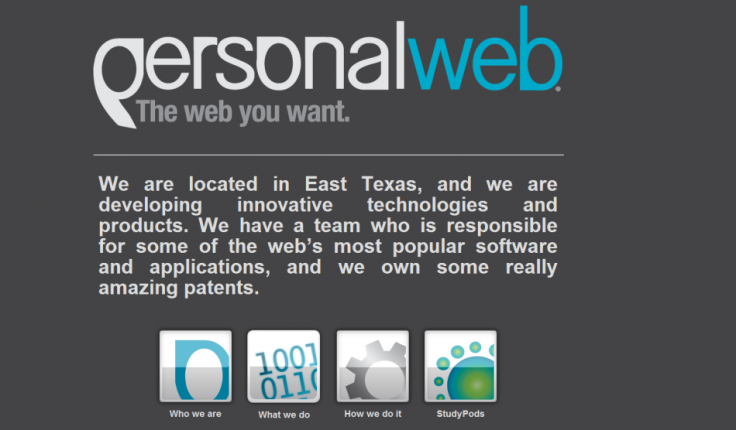Patent Troll Targets Apple, Facebook and Microsoft
A company described as a "patent troll" has this week filed numerous lawsuits against some of the world's biggest and most recognisable technology companies including Facebook, Apple, Yahoo, Microsoft and IBM.

On September 17, PersonalWeb, a company owned by Brilliant Digital Entertainment Inc, filed the lawsuits in the Eastern District of Texas, an area that is infamous for the number of patent cases that are filed there every year. Apple's iCloud and iTunes services were specifically targeted by PersonalWeb among its latest patent infringement claims.
All of the patents in question relate to cloud computing and data processing.
The company has been labelled a patent troll by many in the industry and Kathleen Fox-Murphy, a expert in patent law at Taylor Wessing explains the concept:
"The general concept of a patent troll is a business in which the purpose is to bring in licence fees from the patents which it holds, often having bought the patent rights rather than having filed for them, rather than being concerned with making products and using the technology.
"Some companies who are termed trolls do have some products but nevertheless licensing of their patent portfolio is the substantial part of the business. This is distinct from technology companies who are in the business of innovation, that also get substantial revenues from licensing out patents [but] wouldn't be termed trolls."
Rackspace
Other companies being targeted by PersonalWeb include Rackspace, a leading cloud computing company, and GitHub, a platform that enables software developers to share code and collaborate on projects.
Indeed in one claim filed against Rackspace in Texas, PersonalWeb mentions GitHub's activity, and accuses Rackspace of "further contributing and inducing others to manufacture, use, sell, import and/or offer for sale these infringing products and services."
While GitHub is indeed hosted by Rackspace, the companies are entirely independent of each other. Mentioning GitHub in the same lawsuit as Rackspace adds to the impression that PersonalWeb's approach is a rather scatter-gun one, where it issues as many lawsuits as possible hoping that some might stick.
Rackspace released an official statement highlighting the effects these patent wars can have on innovation, effectively stopping people from innovating using existing technology.
"PersonalWeb has the audacity to file a lawsuit which alleges that "Rackspace Cloud Servers and GitHub Code Hosting Service" infringe some obscure patent from 1999 that has nothing to do with Rackspace and GitHub. Who is truly innovating here, PersonalWeb or Rackspace and GitHub?"
However, in its statement Rackspace goes on to lay the blame not at PersonalWeb's door but at the feet of the lawmakers: "PersonalWeb is not the issue of course. They are just another patent troll attempting to take advantage of bad law. It is their nature. They look for opportunity, and patent litigation can be very profitable. The real problem is the law."
Innovation versus IP
Innovation versus intellectual property laws has been a constant debate in recent years, and while no general consensus has been reached, the US government has been making changes to the legislation to help fight cases of excessive suing.
In September 2011, the Leahy-Smith America Invents Act was passed by Congress and signed by the president. This was the first change implemented by Congress in order to change patent laws. The SHIELD Act is the second change to legislation. The bill was presented over the course of the summer but has yet to pass.
The act would make plaintiffs pay for the defendant's legal cost if the suit was unsuccessful. It is hoped this change of legislation would dissuade patent trolls from filing in multiple claims, even those without proper grounds and that would be dismissed by court immediately.
These new cases brought on by PersonalWeb have resulted in technology entrepreneurs and other members of the industry to call upon politicians to pass the new legislation and change the law to put an end to patent troll cases.
In the meantime, most companies targeted by PersonalWeb are expected to settle out of court, a decision that usually costs less to the company than fighting the issue in front of a judge.
Attacked
This is not the first time that PersonalWeb has attacked companies on the grounds of patent infringement. In fact, last December, the company filed claims against six companies, notably Google and Amazon. The patents mentioned in the claims all had to do with cloud computing and data processing systems. These are the same patents listed for the new set of claims filed on Monday.
Fox-Murphy believes that location where the lawsuits were filed is notable: "The court [in Texas] is known as a "rocket docket" court in which actions can be brought quickly, and where there are more decisions which are favourable to patentees from the juries there than is average in the US."
While PersonalWeb's intentions have not quite been acknowledged yet, there is little surprise to see the defendants dismissing the attack as yet another case of patent trolling.
We contacted PersonalWeb for a comment but at the time of publication have not heard from them.
© Copyright IBTimes 2025. All rights reserved.



















